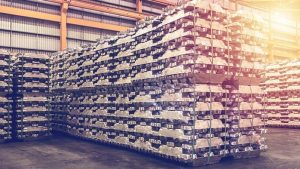SDI announces proprietary low-carbon EDGE products
Steel Dynamics has announced lower-embodied-carbon steel products BIOEDGE and EDGE, and expects “immediate interest” from several markets for some of the offerings.
Steel Dynamics has announced lower-embodied-carbon steel products BIOEDGE and EDGE, and expects “immediate interest” from several markets for some of the offerings.
SDI shipped the first product from its biocarbon facility in Columbus, Miss., in September as the project continues to accelerate.

Musings on decarb, tariffs, and technology, and where it might be leading.

A recent IIMA meeting in Brazil shows how the US and much of the rest of the world are operating in parallel realities.
In the Americas, the ongoing conversion to EAF melting is driving demand for prime grades of scrap and increased use of ore-based metallics

Voestalpine and partners have begun building an industrial-scale Hy4Smelt demonstration plant in Linz, Austria, which they hope will become key in the decarbonization of steel.

As everyone surely knows by now, the SMU Steel Summit starts on Monday in Atlanta, Ga. So, this is a great opportunity to reflect on how much has changed since the 2024 Summit. Certainly, no one could have imagined the wholesale and transformative changes to U.S. and global trade policy.

The administration continues to negotiate deals with US trading partners, and the reciprocal tariff program appears poised for further modification. This week, we focus on other important developments that may have received less media attention.

GSCC certifies eight products from Steel Dynamics and Arkansas Steel Associates.

Rio Tinto is embarking on a major upgrade of the nearly century-old hydroelectric station in Quebec to secure low-carbon power for its aluminum smelters in the region.
The budget proposal has big implications for steel and manufacturing.

Elon Musk's DOGE is determining which Department of Energy grants to advance and which ones to terminate, according to several media outlets
Nucor’s “ambitious” carbon targets by the end of the decade and beyond have been certified by the Global Steel Climate Council (GSCC). The Charlotte, N.C.-based steelmaker used a base year of 2023 for its science-based emissions targets (SBET). It set an SBET of 0.975 metric tons (mt) of CO2 emissions per mt of hot-rolled steel […]
The Department of Energy's Industrial Demonstrations Program page states that it is no longer moving forward with SSAB.
Japan’s Nippon Steel says it has achieved the world’s highest reduction in CO2 emissions to date by using heated hydrogen instead of coal to reduce iron ore in a blast furnace.
This CRU Insight discusses a few key topics our clients have been asking about as 2024 comes to a close and 2025 begins. This piece introduces these topics briefly now before we discuss them in more detail in a webinar in January 2025. In previous years, we have published a year-end Insight on our ‘Top […]
Highlights from the aluminum industry this week

The OECD Steel Committee convened its 96th session last week in Paris, along with the Global Forum on Steel Excess Capacity. The event brought together 250 government and industry delegates from 40 of the largest steel-producing countries. The Committee’s discussions and presentations were clear: Steel markets worldwide are in dire straits.
Aluminum highlights for the week
I joined in a Steel Market Update community chat last week. Predictably, many of the questions concerned the likely results of a Trump or Harris victory in the election. Like most people, I don’t know who will win. But by next week I probably will know. Here is my take, with an emphasis on steel policy. There are a surprising number of similarities between the Democratic and Republican candidates’ positions on steel policy. In part, that is because both candidates are going after the same voters—steel workers, whether unionized or not.

Last month I traveled to Sweden to the CRU Steel Decarbonisation Summit in Stockholm. I wanted to see if the European take on decarbonization was broadly different from what we are talking about here in the US.

Earlier this month, Nippon Steel announced that it is applying for subsidies under the Japanese government’s Green Transformation Promotion Act to expand the company’s electric furnace steelmaking capabilities and to convert from blast furnace to electric furnace operations. As we have said before, transitioning from blast furnace- to electric furnace-based steelmaking is a good thing […]
Sweden’s SSAB has been awarded €128 million by the European Commission for the steelmaker’s efforts at decarbonization.
ArcelorMittal has entered into a 10-year commercial agreement with the Velux Group to supply the Denmark-based roof window maker with an increased amount of sustainably produced steel.
Steel Dynamics Inc. (SDI) has become the world’s first steel producer with carbon targets certified by the Global Steel Climate Council (GSCC).

The Global Steel Climate Council (GSCC) has taken a step forward in standardizing the decarbonization process with the publishing of its labeling for a certified science-based emissions target.

The US Department of Energy (DOE) is launching a pilot project to measure the greenhouse gas (GHG) intensity of certain energy-intensive industrial products, including steel.
U.S. Steel is the first steelmaker in the world qualified to sell its products as “ResponsibleSteel Certified Steel” at its Big River Steel operation in Osceola, Ark.
Whether it’s the twists and turns of the presidential election, the U.S. Steel deal, or just what’s happening with the movement of steel pricing, there has been no shortage of stories for us to cover.
Cleveland-Cliffs Inc. on Monday reiterated its commitment to a major decarbonization project at its Middletown Works in Ohio, despite an earlier report suggesting otherwise.